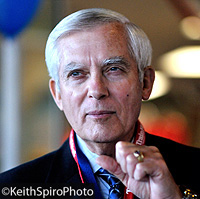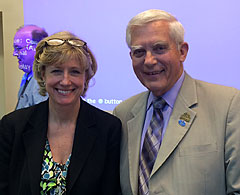
You may not have seen an article that appeared in the Portland paper over the weekend, but no matter. The article concludes with these words:
Wayne Davis, head of Trainriders/Northeast, a rail advocacy group that gathered 90,000 signatures in 1989 for a petition asking the state to restore passenger rail service in Maine, said the group historically avoids politics because it views train service as a nonpartisan issue.
But he said the LePage administration’s sudden strong interest in the permitting process for the layover facility might cause his group to organize rail activists to campaign against LePage in the governor’s race.
“We are not powerful, but it would be enough to put a bump in the road for someone who wants to get re-elected,” he said, adding that he thinks LePage is “tinkering with the most successful train in the nation.”
We heard today from a friend that follows Side and local issues. He tell us that he took exception to Davis’s words, and attempted to respond to them in the comment space that followed the article. He posted his response, successfully he thought, only to have it disappear a short while later. So he reposted it, and had the same thing happen.


Perplexed, he found his way to the Trainriders/Northeast Facebook page, which was promoting the article and Davis’ words. Seeing the comment option there, our friend posted his response, and watched it appear.
Only to see it disappear moments later, along with other comments he had made in recent days.
We don’t know what you think of today’s ‘social media,’ which is the term used to refer to Facebook, Twitter, and other similar internet sites supposedly intended to stimulate immediate and widespread exchange on any and all subjects.
We scrupulously avoid both, except in the rarest of circumstances. We do consider, however, that the ‘comment’ option following print media stories and columns is part of the social media fabric. You might have noted that here on Side, we have an option that allows you to comment on a post.
Readers don’t make use of this feature very often. When they do, as the editor, we get to ‘moderate’ the submitted comments. As best we can recall, in our five years of doing this, we have never removed a comment, and we think, only declined to post a submitted comment one time.
In view of the circumstances, we told our friend that we’d be happy to post his disappearing comment here, where unless forces are at play that we don’t understand, it will appear in perpetuity. Where others, if they wish, can comment in response.
So here it is:
Two comments.
First, the comments by Wayne Davis of Trainriders Northeast are disingenuous and laughable. As to "historically avoiding politics," Davis is well known in the State House for his attempts to influence policy and votes on various issues. He also attempts to stack NNEPRA's Board of Directors with candidates he hand selects.
Not to mention that with the virtual D monopoly on the Statehouse for all but a few of the last 40 years, 'historically avoiding politics' is a concept largely without meaning.
His assertion that the Downeaster is 'the most successful train in the nation' is near-delusional. The Downeaster has nearly the worst on time performance of any Amtrak line, and it operates at a nearly 50% loss. Compare that to the run between New York City and Washington, D.C, for example, and you'll quickly conclude that the Downeaster may well be the least successful train in the nation.
Second, it is very important to be clear on exactly what the FONSI issued in June says verbatim, which I attach below. FRA finds there will be no significant environmental impact, PROVIDED all commitments to adhere to state and local environmental regulations are met. This was not a blanket go-ahead; it was a go-ahead contingent upon proper permitting and design practices.
===========================================================VII. Commitments and Minimization Measures:
NNEPRA will be required to comply with all applicable federal, state, and local permitting requirements during the implementation of the Project, which will include:
Public Law 95‐217, Clean Water Act of 1977, 33 USC § 1251‐1376
Section 106 of the National Historic Preservation Act of 1966, as amended, 16 USC § 470
Section 404 of the Federal Water Pollution Control Act (CWA), 33 USC § 1344
Uniform Relocation Assistance and Real Property Acquisition Policies Act of 1970, as amended, 42 USC § 4601 et seq.
Executive Order 11990, Protection of Wetlands, 42 FR 26961, signed May 24, 1977
This next item, in the highlighted passage, makes it clear that the FONSI is CONDITIONED upon meeting the commitments just above.VIII. Conclusion:
FRA finds that the Brunswick Layover Facility Project, as presented and assessed in the attached EA, satisfies the requirements of NEPA (42 USC § 4321 et seq.), Council on Environmental Quality (CEQ) regulations (40 CFR parts 1500‐1508), FRA’s Procedures for Considering Environmental Impacts (64 FR 28545, May 26, 1999), and FRA’s Update to NEPA Implementing Procedures (78 FR 2713, January 14, 2013), and the Project will have no foreseeable significant impact on the quality of the human or natural environment provided it is implemented in accordance with the commitments identified in this FONSI.As the Project sponsor, NNEPRA is responsible for ensuring all environmental commitments identified in this FONSI are fully implemented. The EA provides sufficient evidence and analysis for FRA to determine that an environmental impact statement is not required for the Project as presented.
So there you have it. We think our friend’s comments suggest a call to one of our favorite graphics of late. Davis seems to personify its message.
And it’s our belief that he could make a sturdier case for the train below being the ‘most successful in the nation than he could for the Downeaster.

That presumes rational thought, of course, which is not widely popular these days. One of the commenters on the newspaper article, whose words were not removed, asserts that the Downeaster is ‘profitable.’
How can one not despair in the face of such abject ignorance and total denial of facts on the public record? Is there no end to the insatiable thirst for kool-aid?












